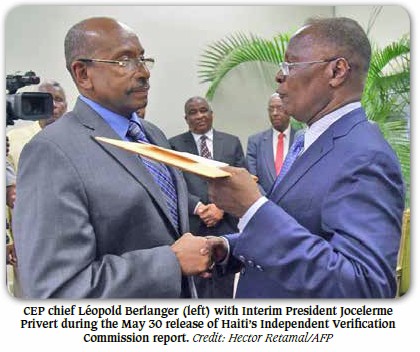|
 On
Mon. Jun. 6, Haiti’s Provisional Electoral Council (CEP)
announced an electoral schedule for the next eight
months, culminating in the inauguration of a new
president on Feb. 7, 2017.
Despite opposition from Washington and former
President Michel Martelly’s Haitian Bald Headed Party
(PHTK), the CEP fully recognized and implemented the
findings and
recommendations
announced on May 30 by Haiti’s Independent Commission of
Electoral Evaluation and Verification (CIEVE).
According to the CEP’s calendar, presidential
candidates must confirm their participation in the new
elections between Jun. 8-22, and for Senate and Deputy
candidates, the registration process will be from Jul.
7-16. The first round of the new elections are scheduled
for Oct. 9 with a run-off on Jan. 8, 2017. The
publication of the final results is scheduled for Jan.
30, 2017, a week before the swearing-in of the newly
elected President.
As for disputed parliamentary elections reviewed
by the CIEVE, the CEP, through a special National
Electoral Complaints and Challenges Bureau (BCEN), will
review 42 disputes for 39 Deputy and three Senate seats.
The CIEVE found that the elections of Aug. 9 and
Oct. 25, 2015 were vast operations of planned fraud, a
genuine electoral coup against the Haitian people.
Therefore, not just the presidential but the
parliamentary elections as well should be reheld so that
the Haitian people can have their true representatives.
While presenting the electoral calendar, CEP
President Léopold Berlanger announced a number of new
reforms to Haiti’s electoral procedures. Voter
registration will be reopened at the National
Identification Office (ONI). Polling station staff and
poll-watchers (mandataires)
will be recruited among young people, especially
students. Berlanger said that the CEP is implementing
all of the CIEVE’s recommendations.
Meanwhile, under one interpretation of a Feb. 5,
2016
agreement, the
120-day term of Interim President Jocelerme Privert ends
on Jun. 14. However, Privert offered another
interpretation, saying: "As long as the elections are
not conducted, the Feb. 5 Agreement retains all its
validity."
So his mission is clear: to hold elections which
were interrupted by popular mobilizations due to massive
fraud. Privert also said that with or without funding
from foreign nations, the elections will take place so
that a new president can be installed on Feb. 7, 2017 in
the National Palace.
The 2015 elections had a price tag of about $100
million. President Privert estimates the coming
elections will cost about $40 million.
While the announcement of new elections is a positive
development, those affiliated with the previous regime
who perpetrated an electoral crime, the theft of popular
votes, and the waste of public funds remain unpunished.
They have not dared raise their voices on most radio
airwaves. Nonetheless, they are likely preparing a new
coup against the provisional president on or around Jun.
14. Their intentions are clear, but it remains to be
seen if they will actually dare to carry out their
subversive plans. They may surely hesitate before
provoking another popular mobilization like that of six
months ago which foiled their attempt to subvert
democracy.
|